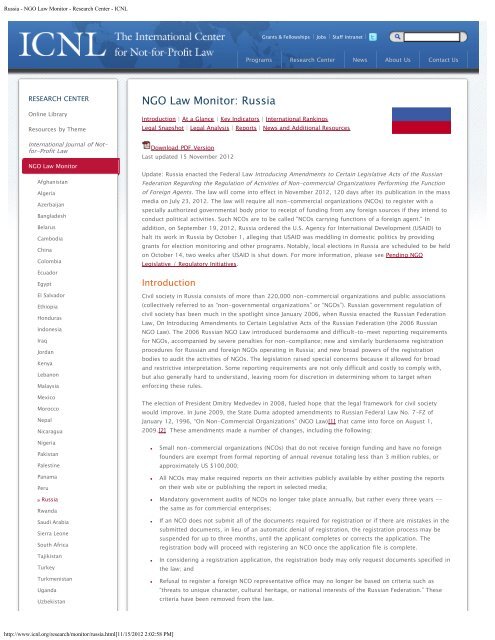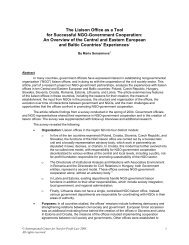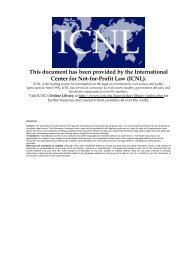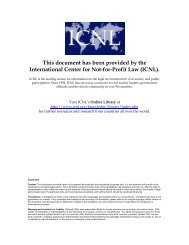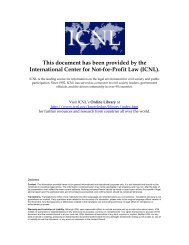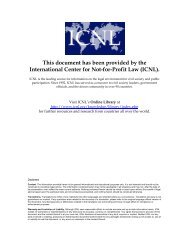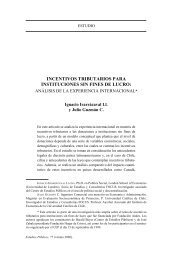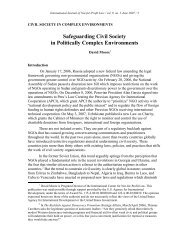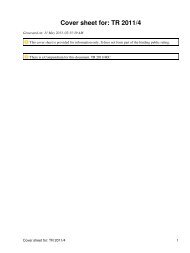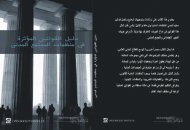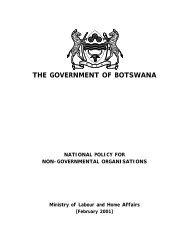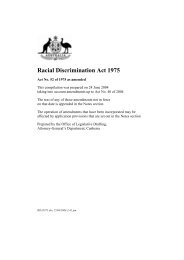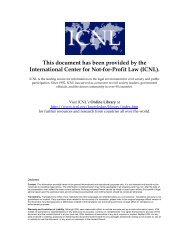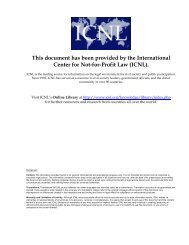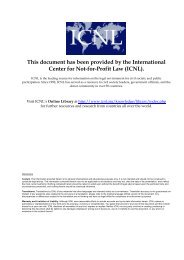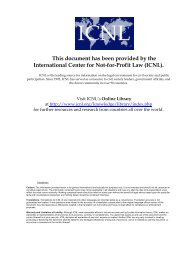Russia - NGO Law Monitor - Research Center - ICNL
Russia - NGO Law Monitor - Research Center - ICNL
Russia - NGO Law Monitor - Research Center - ICNL
You also want an ePaper? Increase the reach of your titles
YUMPU automatically turns print PDFs into web optimized ePapers that Google loves.
<strong>Russia</strong> - <strong>NGO</strong> <strong>Law</strong> <strong>Monitor</strong> - <strong>Research</strong> <strong>Center</strong> - <strong>ICNL</strong><br />
RESEARCH CENTER<br />
Online Library<br />
Resources by Theme<br />
International Journal of Notfor-Profit<br />
<strong>Law</strong><br />
<strong>NGO</strong> <strong>Law</strong> <strong>Monitor</strong><br />
Afghanistan<br />
Algeria<br />
Azerbaijan<br />
Bangladesh<br />
Belarus<br />
Cambodia<br />
China<br />
Colombia<br />
Ecuador<br />
Egypt<br />
El Salvador<br />
Ethiopia<br />
Honduras<br />
Indonesia<br />
Iraq<br />
Jordan<br />
Kenya<br />
Lebanon<br />
Malaysia<br />
Mexico<br />
Morocco<br />
Nepal<br />
Nicaragua<br />
Nigeria<br />
Pakistan<br />
Palestine<br />
Panama<br />
Peru<br />
<strong>Russia</strong><br />
Rwanda<br />
Saudi Arabia<br />
Sierra Leone<br />
South Africa<br />
Tajikistan<br />
Turkey<br />
Turkmenistan<br />
Uganda<br />
Uzbekistan<br />
http://www.icnl.org/research/monitor/russia.html[11/15/2012 2:02:58 PM]<br />
<strong>NGO</strong> <strong>Law</strong> <strong>Monitor</strong>: <strong>Russia</strong><br />
Introduction | At a Glance | Key Indicators | International Rankings<br />
Legal Snapshot | Legal Analysis | Reports | News and Additional Resources<br />
Download PDF Version<br />
Last updated 15 November 2012<br />
Update: <strong>Russia</strong> enacted the Federal <strong>Law</strong> Introducing Amendments to Certain Legislative Acts of the <strong>Russia</strong>n<br />
Federation Regarding the Regulation of Activities of Non-commercial Organizations Performing the Function<br />
of Foreign Agents. The law will come into effect in November 2012, 120 days after its publication in the mass<br />
media on July 23, 2012. The law will require all non-commercial organizations (NCOs) to register with a<br />
specially authorized governmental body prior to receipt of funding from any foreign sources if they intend to<br />
conduct political activities. Such NCOs are to be called "NCOs carrying functions of a foreign agent." In<br />
addition, on September 19, 2012, <strong>Russia</strong> ordered the U.S. Agency for International Development (USAID) to<br />
halt its work in <strong>Russia</strong> by October 1, alleging that USAID was meddling in domestic politics by providing<br />
grants for election monitoring and other programs. Notably, local elections in <strong>Russia</strong> are scheduled to be held<br />
on October 14, two weeks after USAID is shut down. For more information, please see Pending <strong>NGO</strong><br />
Legislative / Regulatory Initiatives.<br />
Introduction<br />
Grants & Fellowships | Jobs | Staff Intranet |<br />
Programs <strong>Research</strong> <strong>Center</strong> News About Us Contact Us<br />
Civil society in <strong>Russia</strong> consists of more than 220,000 non-commercial organizations and public associations<br />
(collectively referred to as “non-governmental organizations” or “<strong>NGO</strong>s”). <strong>Russia</strong>n government regulation of<br />
civil society has been much in the spotlight since January 2006, when <strong>Russia</strong> enacted the <strong>Russia</strong>n Federation<br />
<strong>Law</strong>, On Introducing Amendments to Certain Legislative Acts of the <strong>Russia</strong>n Federation (the 2006 <strong>Russia</strong>n<br />
<strong>NGO</strong> <strong>Law</strong>). The 2006 <strong>Russia</strong>n <strong>NGO</strong> <strong>Law</strong> introduced burdensome and difficult-to-meet reporting requirements<br />
for <strong>NGO</strong>s, accompanied by severe penalties for non-compliance; new and similarly burdensome registration<br />
procedures for <strong>Russia</strong>n and foreign <strong>NGO</strong>s operating in <strong>Russia</strong>; and new broad powers of the registration<br />
bodies to audit the activities of <strong>NGO</strong>s. The legislation raised special concerns because it allowed for broad<br />
and restrictive interpretation. Some reporting requirements are not only difficult and costly to comply with,<br />
but also generally hard to understand, leaving room for discretion in determining whom to target when<br />
enforcing these rules.<br />
The election of President Dmitry Medvedev in 2008, fueled hope that the legal framework for civil society<br />
would improve. In June 2009, the State Duma adopted amendments to <strong>Russia</strong>n Federal <strong>Law</strong> No. 7-FZ of<br />
January 12, 1996, “On Non-Commercial Organizations” (<strong>NGO</strong> <strong>Law</strong>)[1] that came into force on August 1,<br />
2009.[2] These amendments made a number of changes, including the following:<br />
Small non-commercial organizations (NCOs) that do not receive foreign funding and have no foreign<br />
founders are exempt from formal reporting of annual revenue totaling less than 3 million rubles, or<br />
approximately US $100,000;<br />
All NCOs may make required reports on their activities publicly available by either posting the reports<br />
on their web site or publishing the report in selected media;<br />
Mandatory government audits of NCOs no longer take place annually, but rather every three years -the<br />
same as for commercial enterprises;<br />
If an NCO does not submit all of the documents required for registration or if there are mistakes in the<br />
submitted documents, in lieu of an automatic denial of registration, the registration process may be<br />
suspended for up to three months, until the applicant completes or corrects the application. The<br />
registration body will proceed with registering an NCO once the application file is complete.<br />
In considering a registration application, the registration body may only request documents specified in<br />
the law; and<br />
Refusal to register a foreign NCO representative office may no longer be based on criteria such as<br />
“threats to unique character, cultural heritage, or national interests of the <strong>Russia</strong>n Federation.” These<br />
criteria have been removed from the law.
<strong>Russia</strong> - <strong>NGO</strong> <strong>Law</strong> <strong>Monitor</strong> - <strong>Research</strong> <strong>Center</strong> - <strong>ICNL</strong><br />
Venezuela<br />
Yemen<br />
Zimbabwe<br />
African Union<br />
Association of Southeast<br />
Asian Nations<br />
Council of Europe<br />
League of Arab States<br />
Organization of American<br />
States<br />
Organization of Islamic<br />
Cooperation<br />
Organization for Security<br />
and Cooperation in Europe<br />
United Nations Human<br />
Rights Council<br />
Global Trends in <strong>NGO</strong> <strong>Law</strong><br />
http://www.icnl.org/research/monitor/russia.html[11/15/2012 2:02:58 PM]<br />
In May 2012 Vladimir Putin regained the presidency. President Putin, in July 2012, signed a law Introducing<br />
Amendments to Certain Legislative Acts of the <strong>Russia</strong>n Federation Regarding the Regulation of Activities of<br />
Non-commercial Organizations Performing the Function of Foreign Agents. The law will require all noncommercial<br />
organizations (NCOs) to register with a specially authorized governmental body prior to receipt of<br />
funding from any foreign sources if they intend to conduct political activities. Such NCOs are to be called<br />
"NCOs carrying functions of a foreign agent."<br />
Other restrictive laws have been enacted since Vladimir Putin’s return to the presidency. In June 2012, 150fold<br />
and 300-fold increases to existing fines for violating rules on the participation in and organization of<br />
public protests for individuals and organizations, respectively, were enacted. In July 2012, libel was<br />
reintroduced as a criminal offence in <strong>Russia</strong>, which mandates fines on media outlets of up to two million<br />
rubles (approximately $61,000) for producing “libelous” public statements. Also in July 2012, changes<br />
introduced to the <strong>Law</strong> on "Information, Information Technologies and Information Protection" increased<br />
Internet censorship and curbed the freedom of expression.<br />
[1] On July 17, 2009, <strong>Russia</strong>n President Medvedev signed amendments to the <strong>NGO</strong> <strong>Law</strong>.<br />
[2] A <strong>Russia</strong>n version of the amendments is available at http://www.icnl.org/research/library/.<br />
At a Glance<br />
Organizational Forms Non-commercial organizations, public associations<br />
Registration Body Ministry of Justice<br />
Approximate Number Of 220,000 NCOs, 70% are public associations<br />
Barriers to Entry<br />
Barriers to Activities<br />
Barriers to Speech<br />
and/or Advocacy<br />
Barriers to International<br />
Contact<br />
Barriers to Resources<br />
Key Indicators<br />
Certain persons, including foreign persons and stateless persons, may not<br />
become founders, members, or participants.<br />
Back to Top<br />
Registration procedures are overly bureaucratic, with excessive documentation<br />
requirements.<br />
Burdensome reporting requirements.<br />
Supervisory power allowing for interference with internal affairs of public<br />
associations and NCOs<br />
Potential restrictions against NCO advocacy activity may arise through<br />
application of criminal or administrative penalties codes<br />
No legal barriers<br />
Foreign or international organizations wishing to make tax-exempt grants to<br />
<strong>Russia</strong>n citizens or NCOs must be on a list of organizations approved by the<br />
<strong>Russia</strong>n Government; access to this list is severely limited.<br />
NCOs that carry out political activities and receive foreign funding are labeled<br />
"NCOs carrying functions of a foreign agent."<br />
Population 140,041,247 (July 2009 est.)<br />
Capital Moscow<br />
Type of Government Federation<br />
Life Expectancy at Birth 66.03 years<br />
Literacy Rate 99.4%<br />
Religious Groups<br />
Ethnic Groups<br />
Back to Top<br />
<strong>Russia</strong>n Orthodox 15-20%, Muslim 10-15%, other Christian 2% (2006 est.)<br />
note: estimates are of practicing worshipers; <strong>Russia</strong> has large populations of<br />
non-practicing believers and non-believers, a legacy of over seven decades of<br />
Soviet rule.<br />
<strong>Russia</strong>n 79.8%, Tatar 3.8%, Ukrainian 2%, Bashkir 1.2%, Chuvash 1.1%, other or<br />
unspecified 12.1% (2002 census)
<strong>Russia</strong> - <strong>NGO</strong> <strong>Law</strong> <strong>Monitor</strong> - <strong>Research</strong> <strong>Center</strong> - <strong>ICNL</strong><br />
http://www.icnl.org/research/monitor/russia.html[11/15/2012 2:02:58 PM]<br />
GDP per capita $15,800 (2008 est.)<br />
Source: The World Factbook. Washington, DC: Central Intelligence Agency, 2009.<br />
International Rankings<br />
Ranking Body Rank<br />
Ranking Scale<br />
(best – worst<br />
possible)<br />
UN Human Development Index 71 1 – 182<br />
World Bank Rule of <strong>Law</strong> Index 16.7 (2007) 100 – 0<br />
World Bank Voice & Accountability Index 20.2 (2007) 100 – 0<br />
Transparency International 147 1 – 180<br />
Freedom House: Freedom in the World<br />
Status: Not Free<br />
Political Rights: 6<br />
Civil Liberties:5<br />
Foreign Policy: Failed States Index 71 177 – 1<br />
Legal Snapshot<br />
International and Regional Human Rights Agreements<br />
Back to Top<br />
Free/Partly Free/Not<br />
Free<br />
1 – 7<br />
1 – 7<br />
Key International Agreements Ratification* Year<br />
International Covenant on Civil and Political Rights (ICCPR) Yes 1973<br />
Optional Protocol to ICCPR (ICCPR-OP1) Yes 1991<br />
International Covenant on Economic, Social, and Cultural Rights (ICESCR) Yes 1973<br />
Freedom of Association and Protection of the Right to Organize<br />
Convention<br />
International Convention on the Elimination of All Forms of Racial<br />
Discrimination (ICERD)<br />
Convention on the Elimination of All Forms of Discrimination Against<br />
Women (CEDAW)<br />
Optional Protocol to the Convention on the Elimination of Discrimination<br />
Against Women<br />
Yes 1956<br />
Yes 1969<br />
No** --<br />
Yes 2004<br />
Convention on the Rights of the Child (CRC) Yes 1990<br />
International Convention on the Protection of the Rights of All Migrant<br />
Workers and Members of their Families (ICRMW)<br />
No --<br />
Convention on the Rights of Persons with Disabilities (CRPD) No** --<br />
Regional Treaties<br />
European Convention for the Protection of Human Rights and Fundamental<br />
Freedoms<br />
Document of the Copenhagen Meeting of the Conference on the Human<br />
Dimension of the CSCE<br />
* Category includes ratification, accession, or succession to the treaty<br />
** Country is a signatory to the agreement, but has not formally ratified it<br />
Constitutional Framework<br />
Yes 1998<br />
Yes 1990<br />
Back to Top<br />
The Constitution of the <strong>Russia</strong>n Federation (as amended December 30, 2008) includes the following relevant<br />
provisions:<br />
Article 19
<strong>Russia</strong> - <strong>NGO</strong> <strong>Law</strong> <strong>Monitor</strong> - <strong>Research</strong> <strong>Center</strong> - <strong>ICNL</strong><br />
http://www.icnl.org/research/monitor/russia.html[11/15/2012 2:02:58 PM]<br />
1. All people shall be equal before the law and courts.<br />
2. The State shall guarantee the equality of rights and freedoms of man and citizen, regardless of sex, race,<br />
nationality, language, origin, property and official status, place of residence, religion, convictions,<br />
membership of public associations, and also of other circumstances. All forms of limitations of human rights<br />
on social, racial, national, linguistic or religious grounds shall be banned.<br />
3. Men and women shall enjoy equal rights and freedoms and have equal possibilities to exercise them.<br />
Article 28: Everyone shall be guaranteed the freedom of conscience, the freedom of religion, including the<br />
right to profess individually or together with others any religion or to profess no religion at all, to freely<br />
choose, possess and disseminate religious and other views and act according to them.<br />
Article 29<br />
1. Everyone shall be guaranteed the freedom of ideas and speech.<br />
2. Propaganda or agitation instigating social, racial, national or religious hatred and strife shall not be<br />
allowed. The propaganda of social, racial, national, religious or linguistic supremacy shall be banned.<br />
3. No one may be forced to express his views and convictions or to reject them.<br />
4. Everyone shall have the right to freely look for, receive, transmit, produce and distribute information by<br />
any legal means. The list of data comprising state secrets shall be determined by a federal law.<br />
5. The freedom of mass communication shall be guaranteed. Censorship shall be banned.<br />
Article 30<br />
1. Everyone shall have the right to association, including the right to create trade unions for the protection of<br />
his or her interests. The freedom of activity of public association shall be guaranteed.<br />
2. No one may be compelled to join any association and remain in it.<br />
National <strong>Law</strong>s and Regulations Affecting Sector<br />
Relevant national-level laws and regulations affecting civil society include:<br />
Constitution of the <strong>Russia</strong>n Federation, December 12, 1993.<br />
Civil Code of the <strong>Russia</strong>n Federation, Part I, Federal <strong>Law</strong> No. 51-FZ, November 30, 1994 as amended.<br />
Civil Code of the <strong>Russia</strong>n Federation, Part II, Federal <strong>Law</strong> No. 14-FZ, January 26, 1996, as amended.<br />
Federal <strong>Law</strong> No. 7-FZ, "On Non-Commercial Organizations," January 12, 1996, as amended (NCO <strong>Law</strong>).<br />
Federal <strong>Law</strong> No. 135-FZ, "On Charitable Activities and Charitable Organizations," August 11, 1995, as<br />
amended (Charities <strong>Law</strong>).<br />
Federal <strong>Law</strong> No. 82-FZ, "On Public Associations," May 19, 1995, as amended (<strong>Law</strong> on Public<br />
Associations).<br />
Federal <strong>Law</strong> No. 95-FZ, "On Gratuitous Assistance," May 4, 1999, as amended (<strong>Law</strong> on Gratuitous<br />
Assistance).<br />
Special Part of the RF Tax Code regulating property tax of legal entities, effective since January 1, 2004.<br />
Federal <strong>Law</strong> No. 129-FZ, "On State Registration of Legal Entities," August 8, 2001 (<strong>Law</strong> on Registration<br />
of Legal Entities).<br />
Federal <strong>Law</strong> No. 275-FZ, "On Endowments," December 30, 2006.<br />
Tax Code of the <strong>Russia</strong>n Federation, Part I, Federal <strong>Law</strong> No. 146-FZ, July 31, 1998, as amended.<br />
Federal <strong>Law</strong> of the <strong>Russia</strong>n Federation No. 18-FZ, "On Introducing Amendments to Certain Legislative<br />
Acts of the <strong>Russia</strong>n Federation," January 17, 2006.<br />
Decree of the Cabinet of Ministers of the <strong>Russia</strong>n Federation # 212, “On measures aimed at<br />
implementing certain provisions of the federal laws regulating activities of non-commercial<br />
organizations,” April 15, 2006.<br />
Decree of the Ministry of Justice of the <strong>Russia</strong>n Federation #222, "On the Procedure of State Control of<br />
NCO activity (including Spending of Resources)," June 22, 2006.<br />
Tax Code of the <strong>Russia</strong>n Federation, Part II, Federal <strong>Law</strong> No. 118-FZ, August 5, 2000, as<br />
amended.[Excerpts]<br />
Amendments to the Federal <strong>Law</strong> NO. 7-FZ of January 12, 1996 On Non-Commercial Organizations (with<br />
the Amendments and Additions of November 26, 1998, July 8, 1999, March 21, 2002, December 28,<br />
2002, December 23, 2003, January 10, February 2, November 3, December 30, 2006, March 2, May 17,<br />
June 26, November 29, December 1, 2007, May 13, July 22, 23, 2008 ) (adopted by the State Duma and<br />
approved by the Council of Federation in July 2009).<br />
Amendments to the law on public rallies and the administrative code, adopted by the lower chamber of<br />
the <strong>Russia</strong>n Parliament on June 5, 2012 and endorsed by the upper chamber on June 6, 2012
<strong>Russia</strong> - <strong>NGO</strong> <strong>Law</strong> <strong>Monitor</strong> - <strong>Research</strong> <strong>Center</strong> - <strong>ICNL</strong><br />
http://www.icnl.org/research/monitor/russia.html[11/15/2012 2:02:58 PM]<br />
The law "Introducing Amendments to Legislative Acts of the <strong>Russia</strong>n Federation in Part Regulating<br />
Activities of Non-commercial Organisations, which Carry Functions of Foreign Agents," July 21, 2012.<br />
The law on "Information, Information Technologies and Information Protection,” July 30, 2012<br />
Pending <strong>NGO</strong> Legislative / Regulatory Initiatives<br />
<strong>Russia</strong> enacted the Federal <strong>Law</strong> Introducing Amendments to Certain Legislative Acts of the <strong>Russia</strong>n Federation<br />
Regarding the Regulation of Activities of Non-commercial Organizations Performing the Function of Foreign<br />
Agents. The new law will come into effect in November 2012, 120 days after its publication in the mass<br />
media on July 23, 2012. The law will require all non-commercial organizations (NCOs) to register with a<br />
specially authorized governmental body prior to receipt of funding from any foreign sources if they intend to<br />
conduct political activities. Such NCOs are to be called "NCOs carrying functions of a foreign agent."<br />
The law contains other new provisions that have the potential to significantly affect both <strong>Russia</strong>n and foreign<br />
organizations carrying out activities in <strong>Russia</strong>. The provisions are ambiguous and may require elaboration in<br />
regulations yet to be promulgated. In addition, new legislation affecting non-commercial organizations<br />
(NCOs) has been proposed. This legislation includes:<br />
Draft Federal <strong>Law</strong> on Changes to the Code of the <strong>Russia</strong>n Federation on Administrative Offenses, in part<br />
regulating activities of NCOs that carry out the functions of a foreign agent (draft law № 109968-6),<br />
which passed the first reading in the Duma on September 11, 2012<br />
Draft Federal <strong>Law</strong> on Changes to the Criminal Code of the <strong>Russia</strong>n Federation (in part changing criminal<br />
legislation in the area of protection of state secrets from criminal offenses) (draft law № 139314-5),<br />
which passed the first reading in Duma on September 21, 2012<br />
Draft Resolution by the Central Bank of the <strong>Russia</strong>n Federation (<strong>Russia</strong> Bank) on Amendments to Annex<br />
#8 to the Procedure on Provision by Credit Organizations to the Designated Body of Information,<br />
Required in the Federal <strong>Law</strong> On Counteracting Legalization (Money Laundering) of Incomes Received in<br />
a Criminal Way, and Financing Terrorism, which was approved by the <strong>Russia</strong> Bank on August 29, 2008 #<br />
321-П and published on September 18, 2012<br />
All of the above mentioned legislation will be adopted and enacted in fall 2012.<br />
Several other legislative and regulatory initiatives are currently pending, including the following:<br />
On July 30, 2012, an MP announced that the draft <strong>Law</strong> on Volunteers would not be sent to the Duma<br />
after <strong>NGO</strong>s argued that the law would result in burdensome administrative procedures and delays in<br />
carrying out activities. As a compromise, new amendments which prevent volunteer-related expenses<br />
from being taxed will be incorporated into the <strong>Law</strong> on Public Associations and into the Tax Code.<br />
In the fall of 2010, <strong>ICNL</strong> and <strong>Law</strong>yers for Civil Society (LCS) prepared a model draft law on state support<br />
of <strong>NGO</strong>s to promote the implementation of provisions on socially oriented organizations in the Federal<br />
<strong>Law</strong> on Non-commercial Organizations. At the beginning of 2011, the Council on Federations’<br />
Commission on Civil Society Institutions Development sent to all regional legislative bodies letters<br />
urging them to consider the adoption of the draft model regional law on the state support of socially<br />
oriented organizations. Several regional Dumas have begun consideration of such legislation. For<br />
example, the <strong>Law</strong> on “Cooperation between the State Power of the Volgograd Region and Socially<br />
Oriented Organizations” was adopted in June 2011. At least 20 other regions have drafted legislation<br />
based on the model law. Such regional laws might contribute to improved governmental funding of<br />
<strong>NGO</strong>s, and consequently, to their sustainability.<br />
The Draft <strong>Law</strong> on Public Control, which includes provisions that could help provide more opportunities<br />
for <strong>NGO</strong> engagement in policy-making, is currently under discussion by a special working group<br />
created by the Presidential Council on Human Rights and Civil Society.<br />
A package of amendments to the Civil Code (over 400 pages) is under discussion in the Ministries. If<br />
adopted, the reform package would have a profound impact on civil society, as it would reduce the<br />
number of available legal forms for <strong>NGO</strong>s.<br />
Draft amendments to the Federal <strong>Law</strong> “On Counteraction to Extremist Activity” have been registered by<br />
the State Duma.<br />
We are unaware of any other pending legislative/regulatory initiatives affecting <strong>NGO</strong>s. Please help keep us<br />
informed; if you are aware of pending initiatives, write to <strong>ICNL</strong> at infoicnl@icnl.org.<br />
Legal Analysis<br />
Back to Top
<strong>Russia</strong> - <strong>NGO</strong> <strong>Law</strong> <strong>Monitor</strong> - <strong>Research</strong> <strong>Center</strong> - <strong>ICNL</strong><br />
http://www.icnl.org/research/monitor/russia.html[11/15/2012 2:02:58 PM]<br />
Organizational Forms<br />
The <strong>Russia</strong>n Federation (<strong>Russia</strong>) recognizes a large number of organizational forms of non-governmental,<br />
non-commercial organizations (NCOs), resulting in a complex and oftentimes contradictory regulatory<br />
framework. The Civil Code and the Federal <strong>Law</strong> on Non-commercial Organizations (NCO <strong>Law</strong>) establish the<br />
primary NCO legal framework and define a variety of NCO forms (approximately 27), including public<br />
organizations, foundations, institutions, non-profit partnerships, and autonomous non-governmental<br />
organizations. The primary requirements are that NCOs, whatever their type, do not have the generation of<br />
profit as their primary objective and do not distribute any such profit among their participants (Article 50(1),<br />
Civil Code). The Federal <strong>Law</strong> on Public Associations builds upon this framework and carves out a subcategory<br />
of NCOs called "public associations" which consist of public organizations, mass movements, public<br />
foundations, public institutions, and several other forms. Some 220,000 NCOs are registered in <strong>Russia</strong>;<br />
approximately 70% of them are public associations.<br />
Public Benefit Status<br />
NCOs may register as a charity pursuant to the Charities <strong>Law</strong>. Federal law, however, does not provide any<br />
benefits that are particular to registered charities. Although legislation at the regional and local levels offers<br />
tax benefits to charities, they do not necessarily require the organization to be registered as a charity at the<br />
federal level. Tax benefits under <strong>Russia</strong>n law are primarily tied to the support or performance of particular<br />
activities specified in the Tax Code. Registration of an NCO as a charity pursuant to the Charities <strong>Law</strong><br />
provides the organization with a particular status and subjects the organization to heightened scrutiny, but<br />
this status does not in itself provide any unique tax benefits.<br />
Amendments enacted to the NCO <strong>Law</strong> in April 2010 introduced the status of “socially oriented” organizations.<br />
Under the new law, socially oriented organizations will be eligible for governmental support and preferential<br />
tax treatment. <strong>NGO</strong>s engaged in a broad range of activities, including traditional charitable work, the<br />
provision of free-of-charge legal aid and the protection of human rights, will be eligible for the new legal<br />
status, and in turn, for governmental support.<br />
Barriers to Entry<br />
<strong>Russia</strong>n law defines certain restrictions regarding potential founders of NCOs. Regarding non-citizens, only<br />
those foreign nationals and stateless persons who are “legally domiciled in the <strong>Russia</strong>n Federation” may be<br />
founders, members, or participants in public associations or NCOs. Certain persons may not become<br />
founders, members or participants, including:<br />
Foreign nationals or stateless persons whose stay is deemed “undesirable”;<br />
Persons appearing on a money laundering and anti-terrorist financing watch list maintained by the<br />
<strong>Russia</strong>n government;<br />
Organizations that have been suspended under the <strong>Law</strong> Countering Extremist Activities;<br />
Persons found by court decision to show signs of participating in extremist activity; and<br />
Persons who are currently incarcerated as a result of conviction of a crime.<br />
Public associations, such as public organizations and public foundations, by definition can be created only by<br />
natural persons. These organizations cannot be founded by legal persons, but other public organizations may<br />
join as members (Articles 18 and 19, <strong>Law</strong> on Public Associations). By comparison, legal persons, including<br />
commercial entities, may found all other forms of NCOs.<br />
A non-commercial organization shall be subject to state registration in compliance with the NCO law and<br />
Federal <strong>Law</strong> No. 129-FZ of August 8, 2001 on the State Registration of Legal Entities and Individual<br />
Businessmen (hereinafter referred to as the Federal <strong>Law</strong> on State Registration of Legal Entities and Individual<br />
Businessmen). Public associations shall be subject to state registration in compliance with the <strong>Law</strong> on Public<br />
Associations and Federal <strong>Law</strong> on State Registration of Legal Entities and Individual Businessmen. The<br />
registration process for all types of <strong>NGO</strong>s is overly bureaucratic, with a long list of documents required to be<br />
submitted to the authorized governmental body. The same is true for foreign <strong>NGO</strong>s seeking to establish a<br />
branch office.<br />
Barriers to Operational Activity<br />
Public associations, with the exception of specialized organizations such as trade unions and political<br />
associations, have virtually no restrictions on the activities they may pursue as their primary objectives (Article<br />
5, <strong>Law</strong> on Public Associations), including mutual benefit activities (Article 6(1), NCO <strong>Law</strong>, and Article 8, <strong>Law</strong><br />
on Public Associations).<br />
All foundations are required to engage in public benefit activities (Article 118(1), Civil Code, Article 7(1), NCO<br />
<strong>Law</strong>, and Article 10, <strong>Law</strong> on Public Associations). The primary activities of institutions are broadly defined as
<strong>Russia</strong> - <strong>NGO</strong> <strong>Law</strong> <strong>Monitor</strong> - <strong>Research</strong> <strong>Center</strong> - <strong>ICNL</strong><br />
http://www.icnl.org/research/monitor/russia.html[11/15/2012 2:02:58 PM]<br />
any managerial, socio-cultural or other activities of a not-for-profit nature (Article 120, Civil Code, Article 9,<br />
NCO <strong>Law</strong>, and Article 11, <strong>Law</strong> on Public Associations). Charities are required to promote at least one of the<br />
enumerated charitable activities indicated in the law (Article 2, Charities <strong>Law</strong>).<br />
Articles 29 and 38 of the <strong>Law</strong> on Public Associations impose burdensome reporting requirements on public<br />
associations (PAs), by requiring them to submit information about the funding and property they receive from<br />
foreign and international organizations and foreign persons to the registration authority. Article 32 of the <strong>Law</strong><br />
on NCOs imposes reporting requirements for NCOs and requires NCOs to report on their use of funds and<br />
other assets received from both foreign and local sources. Repeated failure on the part of a PA or an NCO to<br />
provide the information required in a timely fashion is grounds for the registration authority to bring a claim<br />
in court requesting a ruling that the organization terminate its activities as a legal entity, which then leads to<br />
its exclusion from the Unified State Register of Legal Entities. More recently, new electronic reporting forms<br />
for NCOs, prepared by the Ministry of Justice, have substantially simplified the reporting process.<br />
Articles 29 and 38 of the <strong>Law</strong> on Public Associations and Article 32 of the NCO <strong>Law</strong> authorize governmental<br />
registration authorities to engage in highly intrusive means of scrutiny of public associations and NCOs<br />
without appropriate procedural protections. The registration authority may use the following tools to<br />
interfere in the internal operations of a PA or NCO:<br />
The power to summon resolutions of the organization’s governing body. The registration authority has<br />
the ability to demand documents dealing with the details of an organization’s governance, including<br />
day-to-day policy decisions, supervision of the organization’s management, and oversight of its<br />
finances.<br />
The power to send representatives to an organization’s events. The <strong>Law</strong> allows the government to send<br />
a representative to all of an organization's events, without restriction, including internal strategy<br />
sessions and grant selection meetings, for example.<br />
The power to review the extent to which an organization’s activities comply with its statutory goals,<br />
including review of its expenditures and property management. The registration authority has authority<br />
to review the compliance of organizations with their goals – even though the registration authority itself<br />
lacks expertise needed to judge whether particular activities are designed to meet an organization’s<br />
goals.<br />
Article 23 of the NCO <strong>Law</strong> also provides the registration authority with two additional intrusive supervisory<br />
powers over the branches, representative offices, and affiliates of foreign <strong>NGO</strong>s. The government can issue a<br />
written decision banning the implementation of any existing program of a branch office of a foreign <strong>NGO</strong>.<br />
The <strong>Law</strong> does not provide any guidance with respect to the grounds on which the government may make this<br />
decision, which appear to be entirely discretionary. Upon receipt of a decision, the office of the foreign <strong>NGO</strong><br />
must terminate the activity, and if it fails to do so, it risks exclusion from the register and liquidation of the<br />
office. The <strong>Law</strong> also allows the registration authority to issue a written decision banning the transfer by an<br />
foreign <strong>NGO</strong>’s branch, representative office, or affiliate of funds or other resources to particular recipients for<br />
the purposes of protecting the basis of the Constitutional system, morality, health, rights and lawful interests<br />
of other persons, and with the aim of defending the country and the state security. The <strong>Law</strong> does provide<br />
foreign <strong>NGO</strong>s the right to appeal against actions taken against them by the government.<br />
Barriers to Speech / Advocacy<br />
Neither the Civil Code nor the NCO <strong>Law</strong> limits the ability of NCOs to engage in advocacy or political activities.<br />
All forms of public associations may participate in advocacy and lobbying activities. Under the law, NCOs<br />
generally may also engage in election campaigns for federal and local elections, subject to federal election<br />
laws (Article 27, <strong>Law</strong> on Public Associations).<br />
A potential obstacle to advocacy activity springs from the general requirement that <strong>NGO</strong> activities must be in<br />
compliance with its by-laws (i.e., if government auditors discover that activities were not outlined in its bylaws,<br />
an <strong>NGO</strong> will be subject to penalties). In addition, there are a range of other regulatory acts (not<br />
specifically targeting <strong>NGO</strong>s), including criminal and administrative penalty codes, which can be applied against<br />
human rights and/or advocacy groups.<br />
Charities are expressly prohibited from using their assets to support political parties, movements, and<br />
campaigns (Article 2(2), Charities <strong>Law</strong>). In addition, religious organizations, governmental and municipal<br />
institutions, international public associations, and international movements are prohibited from making<br />
donations to candidates (Article 58 (6), Federal <strong>Law</strong> No. 19-FZ "On RF President elections," January 10, 2003,<br />
and Article 66 (7), Federal <strong>Law</strong> No. 175-FZ "On RF State Duma deputies elections," July 20, 2002, as<br />
amended). However, these prohibitions do not appear to extend to involvement in lobbying or other<br />
politically-related activities.<br />
In June 2012, increases to existing fines for violating rules on participation in and organization of public
<strong>Russia</strong> - <strong>NGO</strong> <strong>Law</strong> <strong>Monitor</strong> - <strong>Research</strong> <strong>Center</strong> - <strong>ICNL</strong><br />
http://www.icnl.org/research/monitor/russia.html[11/15/2012 2:02:58 PM]<br />
protests were enacted. These fines will likely have a deterrent effect on the right to peaceful assembly. Fines<br />
for breaching provisions on holding public assemblies were increased by 150 times for individuals and 300<br />
times for organizations. The new maximum penalty for participation in a protest that is not in accordance<br />
with government regulations is up to 300,000 rubles (approximately $9,000) for individuals and up to one<br />
million rubles (approximately $32,000) for organizations.<br />
In July 2012, libel was reintroduced as a criminal offence in <strong>Russia</strong>. The law was likely enacted to inhibit<br />
media criticism of <strong>Russia</strong>'s leaders since media outlets can be fined up to two million rubles (approximately<br />
$61,000) for producing libelous public statements.<br />
Also in July 2012, changes introduced to the <strong>Law</strong> on "Information, Information Technologies and Information<br />
Protection"mandated the creation of a registry of websites that contain information which has been prohibited<br />
by a court order. Once a website is placed on this registry it can then be shut down without a court order.<br />
Government officials could interpret the law in a way that would increase Internet censorship and curb the<br />
freedom of expression of organizations that hold views that are different from the government’s or the<br />
majority’s views.<br />
Barriers to International Contact<br />
There are no legal barriers to international communication and contact.<br />
Barriers to Resources<br />
Foreign Funding<br />
<strong>Russia</strong> enacted the law Introducing Amendments to Certain Legislative Acts of the <strong>Russia</strong>n Federation<br />
Regarding the Regulation of Activities of Non-commercial Organizations Performing the Function of Foreign<br />
Agents, which will come into effect in November 2012. The law will require all non-commercial organizations<br />
(NCOs) to register with a specially authorized governmental body prior to receipt of funding from any foreign<br />
sources if they intend to conduct “political activities.” In an attempt to stigmatize these NCOs, they will now<br />
be labeled "NCOs carrying functions of a foreign agent."<br />
Another formidable legal barrier against foreign funding relates to the giving of tax-exempt grants. Foreign<br />
or international organizations wishing to make tax-exempt grants to <strong>Russia</strong>n citizens or NCOs must be on a<br />
list of organizations approved by the <strong>Russia</strong>n Government. Such grants may be made only for purposes<br />
specified by <strong>Russia</strong>n Tax Code: for the implementation of specific programs in the sphere of education, art,<br />
culture, health care (AIDS, drug addiction, children oncology, including oncohematology, children<br />
endocrinology, hepatitis, tuberculosis) environmental protection, protection of human and civil rights, social<br />
services of the disadvantaged and vulnerable groups of citizens, as well as for holding specific scientific<br />
research.<br />
In June of 2008, the <strong>Russia</strong>n Government adopted Decree #485, regarding the Government’s pre-approved<br />
list of foreign grantors (hereinafter referred to as the “List”). Decree #485 contained a reduced number of<br />
approved international organizations and made clear that as of January 1, 2009, only international<br />
organizations mentioned in the Decree could remain on the List. Grants from foreign organizations not<br />
included on the List are considered taxable income for <strong>Russia</strong>n recipients, unless they otherwise qualify as<br />
donations under <strong>Russia</strong>n law. (The current regulation is applicable only to grants; donations, including those<br />
from foreign organizations to non-commercial organizations are tax exempt.)<br />
On March 24, 2009, Prime Minister Putin signed Decree #252, amending Decree #485. Decree #485<br />
empowered the Ministry of Finance to make changes and additions to the List. Decree #252 instead<br />
authorizes interested ministries – and not solely the Ministry of Finance – to initiate changes and additions to<br />
the List.<br />
In addition, NCOs must provide information regarding donations obtained from foreign organizations to the<br />
Ministry of Justice.<br />
Domestic Funding<br />
An NCO may engage in economic activities to the extent they advance the purposes for which the<br />
organization was created, but may not pursue the generation of profit as its primary purpose (Article 50(3),<br />
Civil Code, Articles 2 and 24(2), NCO <strong>Law</strong>, Article 37, <strong>Law</strong> on Public Associations, and Article 12, Charities<br />
<strong>Law</strong>). Profit from the economic activities of NCOs, including charities, is generally taxed in the same manner<br />
as for commercial organizations. Lower tax rates may be offered by regional or local authorities for<br />
qualifying NCOs. Registration as a charity does not affect or limit the right of an NCO to engage in economic<br />
activities (Article 12, Charities <strong>Law</strong>).<br />
In July 2011, the <strong>Russia</strong>n Parliament adopted amendments to the <strong>Russia</strong>n Tax Code that substantially improve<br />
the taxation of NCOs. For example, NCOs no longer have to pay profit tax or value added tax (VAT) on the<br />
value of in-kind contributions (services or property rights) they receive. Moreover, the amendments extend
<strong>Russia</strong> - <strong>NGO</strong> <strong>Law</strong> <strong>Monitor</strong> - <strong>Research</strong> <strong>Center</strong> - <strong>ICNL</strong><br />
http://www.icnl.org/research/monitor/russia.html[11/15/2012 2:02:58 PM]<br />
VAT exemptions previously applied to state budget funded institutions providing social services (i.e. in the<br />
areas of culture, art, health care, education, and services to the needy) to <strong>NGO</strong>s providing the same services.<br />
Reports<br />
UN Universal Periodic Review Reports<br />
National Report<br />
Compilation of UN Information<br />
Corrigendum<br />
Summary of Stakeholders' Information<br />
Questions submitted in advance<br />
Report of the Working Group<br />
Decision on the Outcome<br />
Reports of UN Special Rapporteurs No relevant reports available<br />
USIG (United States International<br />
Grantmaking) Country Notes<br />
U.S. State Department<br />
<strong>Russia</strong>n Federation Country Information current as of<br />
February 2011<br />
Advancing Freedom and Democracy Report 2010: <strong>Russia</strong><br />
2010 Human Rights Report: <strong>Russia</strong><br />
Failed States Index Reports 2012 Foreign Policy Failed States Index<br />
IMF Country Reports<br />
Asia Pacific Philanthropy Forum<br />
Reports<br />
<strong>NGO</strong> Regulation Network Reports<br />
CIVICUS Civil Society Index (CSI)<br />
Country Reports<br />
Concluding Statement of 2009 Article IV Consultation<br />
Mission: <strong>Russia</strong>n Federation<br />
IMF <strong>Russia</strong>n Federation: Selected Issues Paper, 2011<br />
Not available<br />
Not available<br />
Not available<br />
International Commission of Jurists Not available<br />
International <strong>Center</strong> for Not-for-Profit<br />
<strong>Law</strong> Online Library<br />
News and Additional Resources<br />
<strong>Russia</strong><br />
Back to Top<br />
Back to Top<br />
While we aim to maintain information that is as current as possible, we realize that situations can rapidly<br />
change. If you are aware of any additional information or inaccuracies on this page, please keep us<br />
informed; write to <strong>ICNL</strong> at ngomonitor@icnl.org.<br />
General News<br />
Transparency International refuses to comply with <strong>NGO</strong> law (November 2012)<br />
The Moscow office of the anti-corruption coalition Transparency International has issued a statement<br />
announcing its refusal to comply with the recently passed law on foreign agents. “By agreeing to the status of<br />
foreign agent, any organization effectively admits that it is pursuing the interests of a foreign state, or a<br />
foreign or international organization, rather than working for the benefit of its own country – <strong>Russia</strong>,” the<br />
statement reads. “We do not believe that efforts to achieve our organization’s main objective – to fight<br />
corruption – damage, or even fail to benefit, our country.”<br />
Putin suggests some flexibility on anti-dissent laws (November 2012)<br />
Vladimir Putin said he was ready to reconsider the law on high treason, which human rights campaigners say<br />
could mean that any <strong>Russia</strong>n citizen who had contacts with a foreigner could be accused of trying to<br />
undermine the state. Putin also offered to rephrase wording in another bill that envisages stiffer punishments<br />
for defamation, and said parliament should not rush to adopt a law that would introduce jail sentences for<br />
offending religious feelings. He also said he would "look again" at legislation signed in July that requires
<strong>Russia</strong> - <strong>NGO</strong> <strong>Law</strong> <strong>Monitor</strong> - <strong>Research</strong> <strong>Center</strong> - <strong>ICNL</strong><br />
http://www.icnl.org/research/monitor/russia.html[11/15/2012 2:02:58 PM]<br />
foreign-funded non-governmental organisations to register as "foreign agents", saying its main aim was to<br />
prevent foreign meddling in <strong>Russia</strong>'s domestic affairs.<br />
Another law in blatant violation of basic international human rights standards (October 2012)<br />
On October 23, 2012, the <strong>Russia</strong>n Duma (the lower chamber of Parliament) adopted a series of amendments<br />
to the law on treason and espionage, introducing new provisions into the Criminal Code. The new version of<br />
the law is now expected to be examined by the Council of Federation of the <strong>Russia</strong>n Federation (the upper<br />
chamber) and, if adopted, to be signed by President Vladimir Putin. The new text expands the definition of<br />
treason to “providing financial, technical, advisory and other assistance to a foreign State or international<br />
organisation (…) directed at harming <strong>Russia</strong>’s security”, criminalising de facto any contact with any foreign<br />
entity by an extremely elevated and disproportionate sanction up to 20 years’ imprisonment. The vague terms<br />
used open the path to discretionary interpretations by the authorities, raising further concerns on how the<br />
law will be enforced.<br />
<strong>Russia</strong>'s upper house approves law on fines for foreign agents (October 2012)<br />
The Federation Council, <strong>Russia</strong>'s upper house of parliament, approved a law imposing administrative fines for<br />
violating the provisions on the foreign agent status for non-profit organizations. The corresponding<br />
amendments have been introduced to the Code of Administrative Offenses. The amendments to the code<br />
served as an integral part of the draft law assigning a foreign agent status to <strong>Russia</strong>n <strong>NGO</strong>s financed from<br />
abroad and involved in politics.<br />
<strong>Russia</strong>'s <strong>NGO</strong> <strong>Law</strong> will inevitably result in a contraction of space and opportunity for <strong>NGO</strong>s (October 2012)<br />
Boris Pustyntsev, Director of the <strong>Russia</strong>-based Citizens' Watch, speaks to CIVICUS about the impact of the new<br />
'<strong>NGO</strong> <strong>Law</strong>' and recent restrictions on civil society activism in <strong>Russia</strong>.<br />
Rights group says its researcher in Moscow is threatened (October 2012)<br />
A researcher in Human Rights Watch’s office in Moscow received repeated threats this week of an attack<br />
focused on her pregnancy, the rights group said, calling it the latest example of escalating pressure against<br />
rights and civic groups in <strong>Russia</strong>.<br />
<strong>Russia</strong>'s troublesome "traditional values" resolution (October 2012)<br />
Article 19 urges the UN Human Rights Council members to reject a draft resolution proposed by <strong>Russia</strong> on<br />
“traditional values” as the concept may be abused to legitimize discrimination against minority groups, to<br />
silence dissent, and violate human rights. Increasing dialogue on the role of traditional values in society and<br />
raising understanding of the many different values held by people is positive where done within a framework<br />
of respect for human rights. However, the draft resolution fails to recognize that traditional values are not<br />
always invoked positively and have often been abused to legitimize discrimination against marginalized and<br />
minority groups, to silence dissent, and violate people’s human rights.<br />
USAID shutdown in <strong>Russia</strong> will hurt civil society (September 2012)<br />
The United States says it will comply with <strong>Russia</strong>’s request to end all programs of the U.S. Agency for<br />
International Development (USAID), which the U.S. describes as “regrettable.” Experts believe that the action<br />
will hurt <strong>Russia</strong>n <strong>NGO</strong>s that deal with democracy and human rights.<br />
Kremlin evicts USAID from <strong>Russia</strong> in blow to ‘reset’ (September 2012)<br />
The U.S. Agency for International Development (USAID) is ending pro-democracy and civil society programs in<br />
<strong>Russia</strong> at the insistence of the Kremlin, according to reports from U.S. officials close to the situation.<br />
<strong>Russia</strong> demands USAID halt work (September 2012)<br />
The Kremlin sounded its stiffest rebuke to U.S. democracy-building efforts in <strong>Russia</strong> since the fall of the<br />
Soviet Union, ordering the U.S. to halt the work of the U.S. Agency for International Development in <strong>Russia</strong> by<br />
Oct. 1. Since 1992, USAID has distributed $2.7 billion for projects in <strong>Russia</strong> ranging from election monitoring<br />
and prisoners' rights to tuberculosis prevention and education for the handicapped. It had planned to spend<br />
$50 million in <strong>Russia</strong> in 2012, more than half of it on democracy and civic programs—a shift from funding in<br />
the 1990s, which had focused more on economic development.<br />
European Parliament concerned over worsening civil society climate in <strong>Russia</strong> (September 2012)<br />
The human rights situation in <strong>Russia</strong> has deteriorated drastically in the last few months, with the adoption of<br />
a series of laws that could be used to further restrict opposition and hinder freedom of expression, the<br />
European Parliament stated in a resolution. A press release said MEPs were gravely concerned about "the<br />
deteriorating climate" for the development of civil society in <strong>Russia</strong>, pointing to the recent legislation on<br />
demonstrations, <strong>NGO</strong>s, defamation, and the Internet.<br />
<strong>Russia</strong>n regional administration forbids employees contact with ‘foreign agents’ as new <strong>NGO</strong> law gains<br />
traction (September 2012)<br />
The Administration of the Mari El Region 850 kilometers east of Moscow has issued a directive to its officials
<strong>Russia</strong> - <strong>NGO</strong> <strong>Law</strong> <strong>Monitor</strong> - <strong>Research</strong> <strong>Center</strong> - <strong>ICNL</strong><br />
http://www.icnl.org/research/monitor/russia.html[11/15/2012 2:02:58 PM]<br />
to refrain from participating in social or political activities organized by foreign nongovernmental<br />
organizations or <strong>Russia</strong>n <strong>NGO</strong>s receiving funding from foreign sources.<br />
Human-rights organizations to boycott new law on <strong>NGO</strong>s (September 2012)<br />
Two of <strong>Russia</strong>’s oldest human-rights organizations have announced their intention to boycott a law on<br />
“foreign agents.” Duma deputies have said that non-compliance with the new federal law could result in the<br />
forcible closure of organizations.<br />
<strong>Russia</strong>n rights groups taking ‘multi-step’ approach against <strong>NGO</strong> law (September 2012)<br />
<strong>Russia</strong>n civil society groups are developing a diverse range of strategies in response to a new law classifying<br />
non-government organizations as “foreign agents.”<br />
Beyond text, few parallels between new <strong>Russia</strong>n and existing U.S. CSO laws (August 2012)<br />
On August 14th, the Woodrow Wilson <strong>Center</strong> hosted a lecture called “Understanding and Responding to<br />
Attacks on Civil Society: The Rule of Politics and <strong>Law</strong>.” Panelist Carl Gershman, President of the National<br />
Endowment for Democracy, qualified new <strong>Russia</strong>n legislation as an “attack” on the freedom of Civil Society<br />
Organizations (CSOs). The UN Special Rapporteur Maina Kiai and the International <strong>Center</strong> for Not-for-Profit<br />
<strong>Law</strong>'s Nilda Bullain also spoke on the panel.<br />
Clinton affirms <strong>Russia</strong>n human rights activists are not U.S. agents (August 2012)<br />
Moscow Helsinki Group leader Ludmila Alexeyeva and Movement For Human Rights Director Lev Ponomarev<br />
have received from US Secretary of State Hillary Clinton an answer to the question they posed to President<br />
Barack Obama relating to the foreign-agent status of US-funded <strong>Russia</strong>n <strong>NGO</strong>s. Clinton stated clearly that the<br />
United States does not control their activities, nor does the US have any wish to do so.<br />
"A kind of Soviet flavor": Putin taking lessons from Lukashenko? (August 2012)<br />
The Pussy Riot case “reveals as much about the nature of <strong>Russia</strong>n politics as it does about <strong>Russia</strong>‘s problems<br />
with foreign policy and its image abroad,” says a leading opposition activist. Activists suggest <strong>Russia</strong> is<br />
learning from Belarus, not the other way around.<br />
Assembling to promote a positive attitude proscribed (August 2012)<br />
In Saint Petersburg, activists were promoting a positive attitude by wearing funny vintage costumes, sharing<br />
chocolates and standing in the subway with signs greeting people saying "Good morning, Good day."<br />
However, police warned them that this activity is subject to the law on mass gatherings. It seems that almost<br />
any public gathering can be an unauthorized assembly in <strong>Russia</strong> today.<br />
Two years in prison for Pussy Riot (August 2012)<br />
In a sign of the current state of the Kremlin’s thinking, a two-year prison term is perhaps a compromise. In a<br />
packed courtroom in Moscow, with hundreds of protestors in the street outside, Judge Marina Syrova read out<br />
the verdict in the case against three women—Nadezhda Tolokonnikova, Maria Alekhina, and Ekaterina<br />
Samutsevich—from the punk-art collective Pussy Riot: they were guilty of hooliganism inspired by religious<br />
hatred and sentenced to two years each in a <strong>Russia</strong>n prison colony.<br />
<strong>Russia</strong> needs Human Rights Ombudsmen in every region – Putin (August 2012)<br />
<strong>Russia</strong>n President Vladimir Putin lauded the independence of his country’s Human Rights Ombudsmen, and<br />
suggested making the post obligatory for every region of the <strong>Russia</strong>n Federation.<br />
<strong>Russia</strong>’s law on volunteering can be adopted in autumn (August 2012)<br />
A law on volunteering may be adopted in <strong>Russia</strong> this autumn, the deputy speaker of the Federation Council,<br />
Yuri Vorobyev, said. “Possibly, this law can be adopted in autumn. Different public organizations, including<br />
the Public Chamber, are drafting this law,” he told Itar-Tass.<br />
<strong>NGO</strong> law affects <strong>Russia</strong>'s civil society (August 2012)<br />
Hundreds of <strong>Russia</strong>n civil society organizations will not receive foreign grants anymore because of new<br />
restrictions placed on them, despite the fact they depend on such funding to survive. Some organizations<br />
have decided to try to focus on domestic funding.<br />
Blogger and leader of protest movement Aleksei Navalny charged with embezzlement after labeling an official<br />
a “foreign agent” (August 2012)<br />
<strong>Russia</strong>n prosecutors charged the blogger and anticorruption activist Aleksei Navalny with embezzlement, a<br />
statute that carries a sentence of five to 10 years in prison, the Kremlin’s most direct measure to date against<br />
a leader of the protest movement that erupted in December. Mr. Navalny said he believed the case had been<br />
revived in the wake of an unexpectedly large demonstration on May 6, on the eve of Mr. Putin’s inauguration.<br />
One week prior to his arrest, he accused <strong>Russia</strong>’s chief federal investigator, Aleksandr I. Bastrykin, of secretly<br />
owning real estate and other investments in the Czech Republic. Mimicking accusations against <strong>NGO</strong>s,<br />
Navalny referred to the official as a “foreign agent.”
<strong>Russia</strong> - <strong>NGO</strong> <strong>Law</strong> <strong>Monitor</strong> - <strong>Research</strong> <strong>Center</strong> - <strong>ICNL</strong><br />
http://www.icnl.org/research/monitor/russia.html[11/15/2012 2:02:58 PM]<br />
New amendments on volunteering to be developed (July 2012)<br />
The draft <strong>Law</strong> on Volunteers, prepared by the Public Chamber with participation of the <strong>ICNL</strong> Moscow Office,<br />
will not be adopted. The draft was considered controversial by some CSOs and rendered much discussion.<br />
One of the CSOs’ arguments was that the draft could result in more burdensome administrative procedures<br />
and delays in the implementation of activities. This was substantiated by examples from the town of Krymsk<br />
that recently suffered from flooding. The town attracted hundreds if not thousands of volunteers who were<br />
distributing aid to the local people. As a compromise, new amendments on volunteering will be incorporated<br />
into the <strong>Law</strong> on Public Associations and the Tax code to ensure the <strong>NGO</strong>s’ right to involve volunteers in their<br />
activities and to prevent taxation on the reimbursement of volunteering related expenses.<br />
Details of "Foreign Agents" <strong>Law</strong> (July 2012)<br />
President Putin signed a high-profile bill that will relegate politically active <strong>NGO</strong>s receiving funding from<br />
abroad to a registry of “foreign agents.” Once registered, these <strong>NGO</strong>s will face heightened scrutiny. They will<br />
be required to file regular disclosures with the government and to label all materials disseminated through<br />
major channels with their “foreign agent” status. Responding to critics, Duma legislator and bill co-sponsor<br />
Alexander Sidyakin pointed to the similarities between the law and the Foreign Agents Registration Act<br />
(FARA), a similarly worded US statute.<br />
"Foreign Agents" <strong>Law</strong> modeled after US law, says Putin (July 2012)<br />
President Putin says that by adopting the law labeling foreign-funded nonprofits involved in politics ‘foreign<br />
agents’, <strong>Russia</strong>, just like the US, wants to protect itself from external influence. The <strong>Russia</strong>n leader sees<br />
nothing wrong in requiring organizations that get funding from other countries to be registered as foreign<br />
agents. “If foreigners pay for political activity, apparently they are expecting to get some result from that,” he<br />
noted at an annual pro-Kremlin youth forum. “This rule applies only to organizations that are involved in<br />
politics and get financing from abroad,” he stressed.“I believe that in <strong>Russia</strong> we can have a law similar to that<br />
adopted in the United States back in 1938. Why have they protected themselves this way from external<br />
influence and have been using this law for decades? Why can we not do the same in <strong>Russia</strong>?” Putin pointed<br />
out.<br />
<strong>Russia</strong>ns Support Recent <strong>Law</strong>s Restricting Freedoms - Poll (July 2012)<br />
<strong>Russia</strong>ns generally support a number of recently passed laws that impose restrictions on the freedoms of<br />
speech and assembly and on access to information, according to a poll released Thursday by the Levada<br />
<strong>Center</strong>.<br />
<strong>Russia</strong>n rights activists refuse to comply with <strong>NGO</strong> law (July 2012)<br />
<strong>Russia</strong>’s two largest human rights organizations will not comply with the law that labels them as "foreign<br />
agents,” the <strong>NGO</strong>s’ heads said just hours after President Vladimir Putin signed the controversial new <strong>NGO</strong> bill.<br />
Putin signed on Saturday a law forcing non-government organizations engaged in political activities with<br />
foreign financing to be branded as "foreign agents."<br />
Drive to give legal status to volunteers (July 2012)<br />
As volunteerism soars to new highs with the recent Krasnodar region flooding, policymakers are hammering<br />
out the country's first bill that would give legal status to volunteers. A draft of the bill says volunteers would<br />
be obliged to sign cooperation agreements with organizations, according to a copy published by State Duma<br />
Deputy Ilya Ponomaryov of “A Just <strong>Russia</strong>” on his blog.<br />
The Internet law: A good bad example of <strong>Russia</strong>'s backsliding (July 2012)<br />
Duma Bill 89417 is a proposed Internet statute that, among other provisions, would create a blacklist of<br />
websites that all <strong>Russia</strong>ns Internet service providers (ISPs) would have to block and refuse to host. The bill<br />
was hurried through the legislature in one week. (The defamation bill was approved in the Duma's third and<br />
final reading; jail terms were eliminated from an earlier draft, but fines were allowed reaching as high as 5<br />
million rubles or about US$153,000). Both bills now await President Vladimir Putin's signature.<br />
<strong>Russia</strong>n parliament approves restrictions on foreign-funded <strong>NGO</strong>s (July 2012)<br />
<strong>Russia</strong>’s lower house of parliament passed a bill imposing new restrictions on non-governmental<br />
organizations that receive funding from abroad. Although the bill, which is almost certain to pass the upper<br />
house and be signed into law by the president, does not prohibit any organization from operating, it is likely<br />
to create a chilling effect on CSO activities. It reflects the suspicion of the West and the fear of rising<br />
opposition sentiment held by President Vladimir Putin and his backers in the governing United <strong>Russia</strong> party.<br />
Secretary of State Clinton discusses “disturbing” <strong>Russia</strong>n <strong>NGO</strong> <strong>Law</strong> in CoD Governing Council remarks (July<br />
2012)<br />
In her Remarks at the Community of Democracies Governing Council, U.S. Secretary of State Hilary Clinton<br />
stated that “the new legislation being passed in the <strong>Russia</strong>n Duma not only goes after foreign <strong>NGO</strong>s and<br />
funding from foreign <strong>NGO</strong>s, but goes after local, national <strong>NGO</strong>s and civil society, which is really a great
<strong>Russia</strong> - <strong>NGO</strong> <strong>Law</strong> <strong>Monitor</strong> - <strong>Research</strong> <strong>Center</strong> - <strong>ICNL</strong><br />
http://www.icnl.org/research/monitor/russia.html[11/15/2012 2:02:58 PM]<br />
disturbance to the brilliance and the creativity of the <strong>Russia</strong>n people, who have so much to contribute.” She<br />
said she thinks “the Community of Democracies needs to speak out, because whenever a reporter is silenced<br />
or an activist threatened or a civil society organization shut down, it really weakens the social fabric of a<br />
nation.<br />
EU High Representative “highly concerned” about amendments to <strong>Russia</strong>’s <strong>NGO</strong> law (July 2012)<br />
The spokesperson of Catherine Ashton, High Representative of the Union for Foreign Affairs and Security<br />
Policy and Vice President of the Commission, issued a statement on July 10 saying that Ms. Ashton is “highly<br />
concerned by amendments to the <strong>Russia</strong>n <strong>NGO</strong> law that were adopted … against the advice of the <strong>Russia</strong>n<br />
President’s Council on Human Rights and the Development of Civil Society.” The statement notes that these<br />
amendments would force <strong>Russia</strong>n <strong>NGO</strong>s that receive foreign funding “to present themselves as ‘foreign<br />
agents’ in all their activities” and that this “cannot be compared to any legislation or practice existing in the<br />
EU or the US.” According to the statement, “The adoption of this <strong>NGO</strong> law comes amidst several developments<br />
that limit the space for a vibrant civil society in <strong>Russia</strong>, such as the arrests of opposition figures as well as a<br />
new law that stipulates excessive fines for administrative violations during authorised demonstrations.”<br />
PACE Rapporteur Slams <strong>Russia</strong>n Slander Bill As 'Invitation to Punish' Kremlin Critics (July 2012)<br />
A prominent member of the Parliamentary Assembly of the Council of Europe (PACE) has criticized a move by<br />
the <strong>Russia</strong>n State Duma to reintroduce slander as a criminal offense. Switzerland's Andreas Gross said the<br />
new legislation joins a group of harsh new restrictions on everything from Internet use to foreign funding for<br />
nongovernmental organizations that have been whisked through the <strong>Russia</strong>n parliament in the early weeks of<br />
Vladimir Putin's second presidency.<br />
<strong>Russia</strong>'s Ruling Party Seeks ‘Foreign Agent’ Media Bill (July 2012)<br />
Ruling United <strong>Russia</strong> party lawmakers are planning to put some media outlets on the list of “specially<br />
monitored” organizations, the Izvestia daily reported.<br />
UN human rights experts warn of potential damage by <strong>Russia</strong>’s draft law to civil society (July 2012)<br />
A group of United Nations independent experts today warned that a draft law being considered by <strong>Russia</strong><br />
could adversely impact civil society and urged on the Government not to adopt this legislation. “These<br />
amendments constitute a direct affront to those wishing to freely exercise their right to freedom of<br />
association,” the Special Rapporteur on the rights to freedom of peaceful assembly and of association, Maina<br />
Kiai, said in a news release.<br />
Parties Ask <strong>Russia</strong>n Constitutional Court To Review Demonstrations <strong>Law</strong> (July 2012)<br />
Two <strong>Russia</strong>n political parties have appealed to the Constitutional Court to rule on the legality of a recently<br />
adopted law mandating heavy fines for organizing or participating in unsanctioned demonstrations. More<br />
than 100 lawmakers from the A Just <strong>Russia</strong> and Communist parties signed the appeal, which argues that the<br />
massive increase in fines and the introduction of mandatory public-service sentences for some violations are<br />
unconstitutional.<br />
Looking for Foreign Agents in All the Wrong Places (July 2012)<br />
For more than a year, the Kremlin has been promising that there would be a "symmetric response" to the U.S.<br />
Magnitsky act. The problem, though, was that a strictly symmetric response would require freezing the<br />
<strong>Russia</strong>n-based assets of U.S. government officials who are implicated in human rights abuses. Since few<br />
would qualify for this blacklist, the Kremlin resorted to an asymmetric response — a United <strong>Russia</strong> proposal<br />
to amend the law regulating nongovernmental organizations.<br />
<strong>NGO</strong> laws indicate Putin’s strategic failure, political frailty (July 2012)<br />
<strong>Russia</strong>’s lower house of parliament today passed a bill imposing new restrictions on foreign-funded nongovernmental<br />
organizations. The regulations are reminiscent of Soviet secret police methods, the head of the<br />
Council of Europe said yesterday. “Although the bill, which is almost certain to pass the upper house and be<br />
signed into law by the president, does not prohibit any organization’s operation, it is likely to create a chilling<br />
effect on groups’ activities,” reports suggest.<br />
<strong>Russia</strong>'s Internet blacklist looms in freedom crackdown (July 2012)<br />
The United States had SOPA, and Britain has the Digital Economy Act. China is -- well, in a league of its own.<br />
<strong>Russia</strong> is next on the list of developed nations pushing for widespread website blocking and censorship<br />
capabilities in the wake of an online uprising prior to the inauguration of <strong>Russia</strong>n president Vladimir Putin.<br />
Thousands of protesters took to the streets, set up blogs, and disseminated demands for a fresh ballot over<br />
social networks following claims of rigged votes and electoral corruption in the recent presidential elections.<br />
Transparency International calls on <strong>Russia</strong> to reject draconian amendments to laws governing <strong>NGO</strong>s (July<br />
2012)<br />
Transparency International calls on the <strong>Russia</strong>n parliament to reject the proposed amendments to the law<br />
governing non-governmental organizations. The new regulations, if passed, would severely limit civil
<strong>Russia</strong> - <strong>NGO</strong> <strong>Law</strong> <strong>Monitor</strong> - <strong>Research</strong> <strong>Center</strong> - <strong>ICNL</strong><br />
http://www.icnl.org/research/monitor/russia.html[11/15/2012 2:02:58 PM]<br />
society’s ability to hold governments to account and would misrepresent what non-governmental<br />
organizations do. “Singling out organizations that work on legitimate public issues, such as access to<br />
information, the rule of law and whistle-blower protection, and labeling them “agents of foreign influence” is<br />
completely wrong and sends an ominous message to the people of <strong>Russia</strong> who took to the streets more than<br />
20 years ago to fight for their freedoms,” said Huguette Labelle, Chair of Transparency International.<br />
Putin signs draconian law restricting freedom of assembly (June 2012)<br />
The <strong>Russia</strong>n State Duma voted in favor of a bill to increase the fees for unsanctioned meetings one hundred<br />
and fifty-fold. The legislature’s upper house signed the bill after which President Putin signed it into law.<br />
Supporters of the law argue that it is an attempt to bring <strong>Russia</strong>n legislation in compliance with European<br />
standards. In a letter to the Financial Times, for example, Putin spokesperson Dmitry Peskov wrote that in<br />
introducing the law the <strong>Russia</strong>n government is “striving for legislation that is comparable to the regulation of<br />
political protests in the west” and is “inspired by the European example.”<br />
New <strong>Russia</strong>n bill aims to brand <strong>NGO</strong>s as 'foreign agents' (June 2012)<br />
Nongovernmental organizations operating in <strong>Russia</strong> on grants from abroad could soon be officially branded<br />
as "foreign agents." Under a new bill submitted to the State Duma by deputies from the ruling United <strong>Russia</strong><br />
party, the requirement would apply to foreign-funded <strong>NGO</strong>s deemed to be engaged in political activities. "I've<br />
prepared a draft law on introducing amendments to the <strong>NGO</strong> law. We'll submit it soon," Aleksandr Sidyakin,<br />
one of the bill's authors, wrote on Twitter. "Prepare your cash, foreign agents! :)"<br />
Parliament to label externally-funded <strong>NGO</strong>s as foreign agents (June 2012)<br />
The <strong>Russia</strong>n State Duma is pondering legislative amendments that would rename all <strong>NGO</strong>s that receive<br />
funding from abroad into ‘foreign agents’ with obligatory mentioning of this status in all media reports. The<br />
suggested legislative changes would require that all <strong>NGO</strong>s registered within <strong>Russia</strong> but receiving money or<br />
property from foreign sources, state and private alike, be considered “foreign agents” once they get involved<br />
in political activities, one of the amendments’ initiators, United <strong>Russia</strong> State Duma deputy Aleksander<br />
Sidyakin, said.<br />
<strong>Law</strong> on rallies awaits Putin’s signature (June 2012)<br />
Following 12 hours of tense debate, <strong>Russia</strong>'s State Duma has adopted amendments to the law on rallies,<br />
slapping harsher penalties on participants and organizers alike.<br />
Putin signs law with new restrictions on peaceful assembly (June 2012)<br />
President Putin signed into law the new restrictive amendments to the law on public rallies and the<br />
administrative code, which had been adopted by the lower chamber of the <strong>Russia</strong>n Parliament on June 5 and<br />
endorsed by the upper chamber on June 6. President Putin dismissed the concerns of numerous <strong>Russia</strong>n and<br />
international human rights groups and told the news media that the new law was to protect <strong>Russia</strong>n nationals<br />
from radicalism. He said that the law imposed no more restrictions on freedom of assembly than is permitted<br />
under prevailing European norms.<br />
<strong>Russia</strong>n President Putin defends <strong>Russia</strong>’s human rights record after EU meeting (June 2012)<br />
Under pressure from the West, <strong>Russia</strong>n President Vladimir Putin on Monday defended his country’s human<br />
rights record, claiming that <strong>Russia</strong> has no political prisoners and dismissing criticism of a draconian bill that<br />
increases fines for unsanctioned street rallies.<br />
<strong>Russia</strong>'s civil society 'beats authorities' in tackling corruption (May 2012)<br />
<strong>Russia</strong>'s civil society has made a dramatic leap forward over the past three years and is doing much more to<br />
curb corruption than the authorities. Yelena Panfilova, a prominent, outgoing member of the presidential<br />
anti-corruption and human rights council, said on Wednesday.<br />
Deputy Assistant Secretary for the Bureau of Democracy, Human Rights and Labor meets civil society<br />
advocates from <strong>Russia</strong> (April 2012)<br />
Thomas O. Melia, who serves as the Deputy Assistant Secretary for the Bureau of Democracy, Human Rights<br />
and Labor, welcomed to the State Department a dozen inspiring civil society advocates from <strong>Russia</strong>. He noted<br />
that civil society is an essential driver of progress and accountability on an array of important issues,<br />
including prison reform. Over the past year, <strong>Russia</strong>n civil society advocates, including some of the activists<br />
who took part in the meeting, have been working to prevent another tragedy like that of Sergei Magnitsky,<br />
who dies from abuse and neglect in a Moscow pre-trial detention center.<br />
Freedom of speech concerns arise as protest singers face seven-year jail sentences (April 2012)<br />
A court rejected calls to free imprisoned members of a feminist punk band that performed a protest song<br />
against Vladimir Putin inside Moscow's main cathedral. Three members of Pussy Riot had their detention<br />
extended until June 24 in a case that has provoked disputes over freedom of speech and the close<br />
relationship between the <strong>Russia</strong>n Orthodox Church and the Kremlin. They face jail sentences of seven years if<br />
convicted of hooliganism for the "punk prayer" against Mr. Putin sung from the pulpit of Christ the Saviour
<strong>Russia</strong> - <strong>NGO</strong> <strong>Law</strong> <strong>Monitor</strong> - <strong>Research</strong> <strong>Center</strong> - <strong>ICNL</strong><br />
© 2012 International <strong>Center</strong> for Not-for-Profit <strong>Law</strong> (<strong>ICNL</strong>) Site Map | Privacy Policy / Terms of Use<br />
http://www.icnl.org/research/monitor/russia.html[11/15/2012 2:02:58 PM]<br />
Cathedral, in Moscow on February 21.<br />
Nonviolent protests in <strong>Russia</strong>: About the elections or also for the future? (March 2012)<br />
Only two years ago, civil protests would have been of marginal interest to most <strong>Russia</strong>ns. Citizens would not<br />
even dare cross a boulevard carrying banners in their numb hands. The author of this article - a young,<br />
independent writer – discusses the change in <strong>Russia</strong>ns’ mentality about civil protest and shares her views on<br />
the structure of the protest movement.<br />
International <strong>NGO</strong>s urge authorities of Ukraine, Belarus and <strong>Russia</strong> to take measures to protect journalists<br />
(January 2012)<br />
The international human rights organizations Article 19 and International Media Support (IMS) have called on<br />
the authorities of Ukraine, Belarus and <strong>Russia</strong> to take every legal and political measure needed to protect<br />
journalists and defend the right to freedom of expression in these countries. "We recommend establishing<br />
effective cooperation between human rights organizations and journalist organizations for the provision of<br />
mutual support," Senior Communications and Advocacy Officer at Article 19 Oliver Spencer said at the<br />
presentation of the recommendations to the report "No Justice for Journalists in Ukraine, Belarus and <strong>Russia</strong>"<br />
in Kyiv on Monday.<br />
News archive<br />
Why <strong>Russia</strong>’s democrats need West’s support (October 2011)<br />
Government to increase support for <strong>NGO</strong>s - Medvedev (September 2011)<br />
Arkhangelsk <strong>NGO</strong>s adapting to <strong>Russia</strong>n reality (September 2011)<br />
<strong>Russia</strong>n court makes foreign donations to <strong>NGO</strong>s tax free (September 2011)<br />
The Rebirth of <strong>Russia</strong>n Civil Society (July 2011)<br />
Medvedev urges development of endowment funds (June 2011)<br />
Putin's <strong>Russia</strong> could face revolt - whistleblower (June 2011)<br />
European Court Rebukes <strong>Law</strong> on Parties (April 2011)<br />
U.N. says <strong>Russia</strong>n efforts on human rights fall short (February 2011)<br />
The foregoing information was collected by the <strong>ICNL</strong> <strong>NGO</strong> <strong>Law</strong> <strong>Monitor</strong> partner organization in <strong>Russia</strong>.<br />
Back to Top


